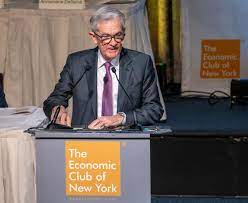Jerome Powell, the chairman of the Federal Reserve, stated on Thursday that the inflation rate is still too high and that it will probably take a slower expansion of the labor market and economy for it to reach the Fed’s target level.
Inflation has decreased dramatically from a year ago, according to Powell. But he issued a warning that because the economy is expanding more quickly than the Fed had anticipated, high inflation may endure. The Fed chair explained that, as a result, it’s unclear if inflation is returning steadily to the Fed’s 2% target.
Powell stated during a talk at the Economic Club of New York, “We certainly have a very resilient economy on our hands.” “Many predictions indicated that the US economy would experience a recession this year. Not only has that not occurred, but growth is also above its longer-term trend for this year. That’s unexpected, then.
Powell’s remarks echoed remarks made this week by other Fed officials, underscoring the fact that they are coping with an unusual and unexpected development: Even though economic growth and hiring have been strong, inflation is falling.
The Federal Reserve has increased its benchmark interest rate 11 times since March 2022, bringing it to approximately 5.4%, its highest level in 22 years, in an effort to control inflation. Despite having dropped from its high of the previous year, inflation still needs to rise to the Fed’s target of 2%. Slower economic growth will probably be needed to achieve this.
Powell warned on Thursday that if the strong hiring and economic expansion continue, the central bank may need to hike its benchmark rate further. Numerous households and businesses are now financially burdened as a result of the Fed’s protracted run of rate hikes, which have increased the rates of credit card borrowing, business loans, and vehicle and home loans.
In addition, Powell said that a rise in longer-term bond rates may mean that the Fed won’t need to implement another boost, at least not very soon. The average cost of a 30-year mortgage has increased by about 8% as a result of the spike in long-term rates. In addition to the Fed’s own short-term rate increases, higher long-term rates could aid in slowing growth and containing inflation, reducing pressure on the Fed to raise rates even further.
Powell added, “That’s exactly what we’re attempting to accomplish.
He said that “at the margin,” “it could” imply that the Fed won’t need to hike rates any further.
Powell, however, said that there was no proof that interest rates were excessive at the moment, suggesting that the Fed might raise them further without sparking a recession.
When asked about the economy’s resiliency in the face of interest rate increases on Thursday, Powell said that rates “haven’t been high enough for long enough.” Many analysts anticipate that the Fed will maintain interest rates high for a considerable amount of time, even if it doesn’t raise them again.
A rate increase would be implemented before the end of the year according to a prediction made by Fed policymakers last month. When the central bank meets again in roughly two weeks, economists and Wall Street traders anticipate it will maintain current interest rates.
Recent economic statistics have shown that the economy is currently expanding well and that inflation may continue to be high.
The hiring rate in September exceeded expectations, while the jobless rate remained close to a 50-year low. Strong hiring generally gives employees the power to demand higher salaries, which might increase inflation if their employers pass on the higher labor costs by raising their prices.
Powell did, however, observe that wage growth had slowed thus far. Inflation may be kept in check by the cooling of other job market indicators. The Fed’s preferred measure of price movements dropped to 3.5% in September compared with a year earlier, down significantly from a year-over-year top of 7% in June 2022. In fact, even with strong economic growth, inflation has generally slowed.
An important member of the Fed’s governing board named Christopher Waller said on Wednesday that the drop in inflation while the economy has stayed strong is “great news” but also “a little too good to be true.” He pointed out that growth might either weaken, which would aid in containing inflation, or remain robust, which would fuel higher inflation and necessitate further rate increases by the Fed.
It is too soon to say, according to Waller. “I think we should wait to make definite decisions and instead just watch how the economy develops.”

















